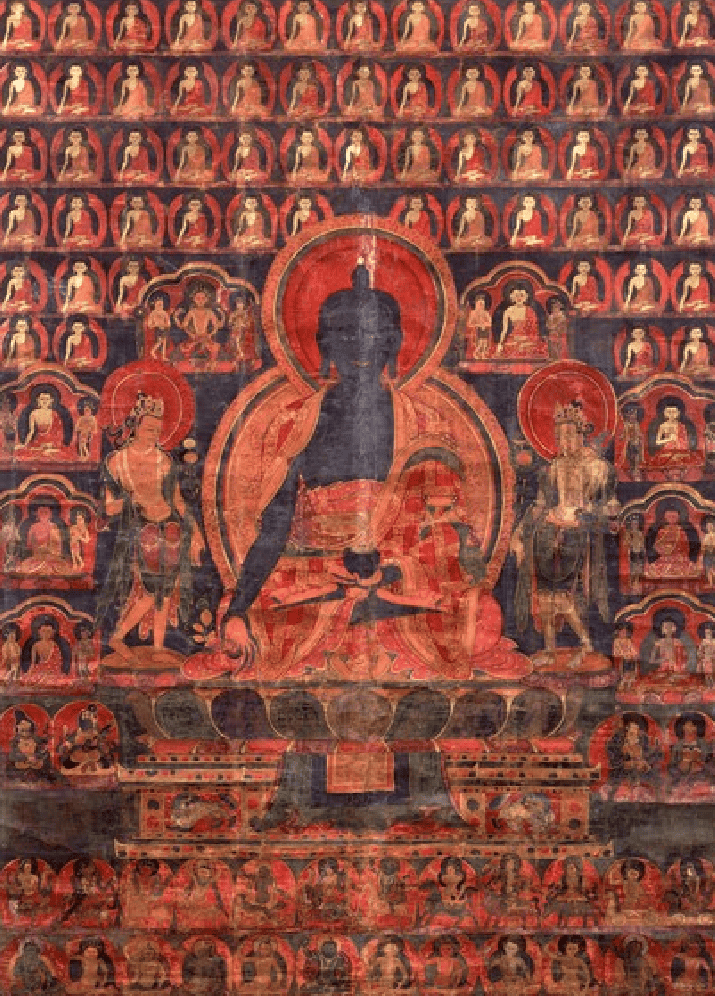Bhaiṣajyaguruvaiḍūryaprabha, the blue-colored buddha of healing, commonly known as Medicine Buddha, is usually depicted holding an alms bowl out of which appears a sprig of myrobalan (harītakī), a Himalayan plant said to have great powers to heal and bestow longevity. He is the buddha of the pure land in the eastern direction, named Vaiḍūryanirbhāsa, or “Pure Blue Beryl”. Two great bodhisattvas serve as his attendants, Sūryaprabha, who represents the light of the sun, and Candraprabha, who represents the light of the moon. According to the original sutra introducing the Medicine buddha, his pure land is peerless, constructed of blue beryl, and adorned with parapets made of the seven precious substances. Buddha Śākyamuni himself reports that this pure land is equal in quality to Sukhāvatī.
In the Mahayana sutra, The Detailed Account of the Previous Aspirations of the Blessed Bhaiṣajyaguruvaiḍūryaprabha, Buddha Śākyamuni responds to questions from the bodhisattva Mañjuśrī concerning the aspirations of other buddhas. The Buddha describes how in the distant past, there were twelve great aspirations made by Bhaiṣajyaguruvaiḍūryaprabha to benefit beings in the future. This sutra exists in Sanskrit, Tibetan and Chinese languages, and references are found to it in all those languages, indicating its popularity throughout the Mahayana Buddhist world.
Although these twelve aspirations did not all specifically reference healing powers, the most renowned among them did relate to protecting people from physical illnesses and suffering. In both of these aspirations, he vowed that simply hearing his name would bring relief from suffering and cause beings to live healthy lives until they attain awakening.
For his sixth great aspiration, he proclaimed, “In the future, when I have attained awakening as a perfect buddha who has manifested unsurpassed and perfect awakening, may beings who have weak constitutions, impaired faculties, or poor complexions; who are dumb, lame, hunchbacked, or have vitiligo; who have only one eye or are blind, deaf, or mentally ill; and whose bodies are otherwise affected by illness hear my name. When they do, may all their faculties become whole and their bodies intact.”
For his seventh great aspiration, he proclaimed, “In the future, when I have attained awakening as a perfect buddha who has manifested unsurpassed and perfect awakening, may beings whose bodies are afflicted by various types of illnesses, who are vulnerable, who are defenseless, who lack necessities and medicines, who have no one to care for them, who are poor, and who suffer hear my name, and may all their illnesses be quelled. May they be healthy and live free from harm for as long as it takes them to attain awakening.”
The Detailed Account of the Previous Aspirations of the Blessed Bhaiṣajyaguruvaiḍūryaprabha
In the same sutra, the Buddha also elaborates on the benefits of making offerings to the Medicine Buddha, and of simply hearing his name. This benefit extends to protecting women from the pain and suffering of childbirth and endowing the child with all good qualities:
“If any woman giving birth who experiences intense, fierce, and unbearable suffering makes offerings to the blessed Thus-Gone Bhaiṣajyaguruvaiḍūryaprabha, she will immediately be liberated from that suffering. The child will be born with all its limbs intact, and it will have a good physique, be handsome and good looking, have sharp faculties, be intelligent and healthy, and have few difficulties. Nonhuman beings will not be able to steal its vital energy.”
The Detailed Account of the Previous Aspirations of the Blessed Bhaiṣajyaguruvaiḍūryaprabha
In addition to reciting or recalling the name of the Medicine Buddha, the recitation of his dhāraṇī has also been highly praised. Several versions exist, but the most frequently used (shorter) version is:
ཏདྱ་ཐཱ། ཨོཾ་བྷཻ་ཥ་ཛྱེ་བྷཻ་ཥ་ཛྱེ་མ་ཧཱ་བྷཻ་ཥ་ཛྱེ་རཱ་ཛ་ས་མུདྒ་ཏེ་སྭཱ་ཧཱ།
teyata om bhekanze bhekanze maha bhekanze radza samudgaté soha1Tibetan pronunciation
tadyathā oṃ bhaiṣajye bhaiṣajye mahā-bhaiṣajye rāja-samudgate svāhā2Sanskrit pronunciation



